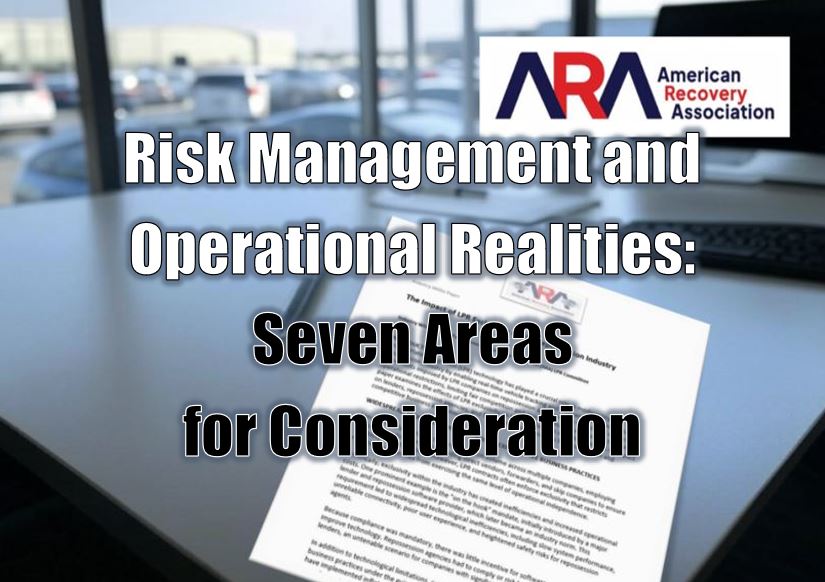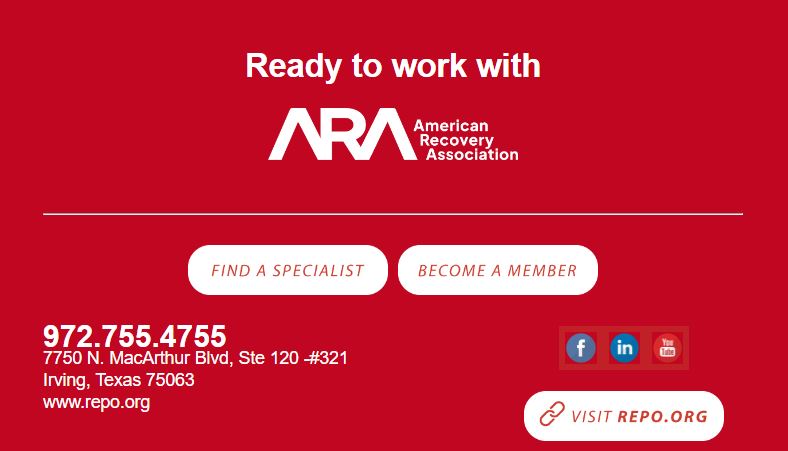Industry White Paper – Risk Management and Operational Realities: Seven Areas for Consideration
INTRODUCTION
May 5, 2025 – The automotive repossession industry continues to evolve in complexity and institutional risk. As vehicles become more technologically advanced and client demands increase, professional recovery specialists face rising operational costs; complex storage and other operational challenges; as well as increased compliance demands.
To promote adherence to professional standards, and to ensure no industry participants are competitively disadvantaged, industry stakeholders—lienholders, forwarders, professional recovery specialists, and vendors alike—must consider and address these modern challenges.
This white paper outlines the following seven areas for examination, and key take-aways for each:
-
Prevalence of Flatbed and Dolly Use
-
Storage Realities
-
Dropped Repo Scenarios
-
Indemnification Provisions
-
Insurance Coverage Amounts
-
Force Majeure Provisions
-
Stolen and Damage Vehicle Issues
ARA recommends that all members and industry stakeholders (or others who may read this white paper) retain counsel and insurance professionals of their choosing to assess and advise on these issues based on the relevant individual circumstances presented.
AREAS FOR EXAMINATIONS
__
1 – Prevalence of Flatbed and Dolly Use
Context:
Modern vehicles—including those with 4WD, AWD, electric drivetrains, and electronic parking brakes—often require specialized equipment to repossess safely and without damage. The use of flatbeds or dollies is no longer exceptional; it is standard operating procedure in today’s environment.
Take-Away:
- Industry stakeholders all should acknowledge that flatbed and dolly use is a routine necessity—not an added luxury.
- Objective operational protocols and compliance expectations help decrease risk and optimize outcomes for all industry stakeholders.
__
2 – Storage Realities
Context:
The automotive recovery industry faces historic logistical and operational challenges regarding post-repossession vehicle storage. Extended storage periods increase these challenges, present additional liability exposure, reduce available lot space for incoming recoveries, and discourage timely resolution and vehicle turnover.
Take-Away:
- Industry stakeholders should acknowledge the logistical, capacity, and operational issues attendant to vehicle storage.
- Objective operational protocols and compliance expectations help decrease risk and optimize outcomes for all industry stakeholders.
__
3 – Dropped Repo Scenarios
Context:
A “dropped repo” refers to a situation in which a professional recovery specialist determines that it is necessary to disengage and leave the vehicle. This may occur due to various circumstances, including—but not limited to— avoidance of a potential breach of peace or the borrower contacting the lender to make a payment over the phone, thereby resolving the delinquency and negating the repossession. These situations demand discretion, situational awareness, and professionalism to prioritize the safety of both the agent and the consumer while ensuring a responsible and effective outcome.
Take-Away:
- Professional recovery specialists trained to de-escalate confrontations from borrowers take on legal and compliance risk.
- Industry stakeholders should work together to establish operational protocols and compliance expectations for handling dropped repo scenarios.
- Industry stakeholders should consider these legal and compliance risks and work together to mitigate them and promote a safe and compliant environment for all involved.
__
4 – Indemnification
Context:
Asymmetrical indemnity clauses—i.e., those that fail to apportion risk properly based on the actions or omissions of the contract parties—create disproportionate risk and exposure, and disincentivize partnership.
Take-Aways:
- Mutual indemnification provisions:
- Hold each party responsible for their respective actions or omissions; and
- Allocate risk in a balanced and defensible manner.
- Mutual indemnity fosters trust and fairness across all business relationships.
__
5 – Insurance Coverage Amounts
Context:
Insurance coverage is a necessity in any highly regulated industry involving consumer lending. Coverage should be proportionate to the risk involved. Coverage requirements should not distort the competitive landscape—for example, by driving up operational and premium costs unnecessarily.
Take-Aways:
- Risk should dictate coverage amounts.
- No industry participants should be competitively disadvantaged by coverage requirements.
__
6 – Force Majeure Provisions
Context:
Unforeseen events—sometime referred to as “acts of God” and ranging from natural disasters to civil unrest—can disrupt business operations and jeopardize production.
Take-Away:
- Industry stakeholders should consider force majeure events.
- Industry stakeholders should strive for equitable outcomes in truly uncontrollable situations.
__
7 – Stolen, Damaged Vehicle Issues
Context:
Like the indemnification and insurance coverage issues discussed above, the potential that a vehicle may be damaged or stolen during or after repossession presents risk allocation considerations.
Take-Aways:
- Industry stakeholders should strive for clarity regarding objective compliance and reporting protocols.
- Industry stakeholders should acknowledge the practical realities presented by damaged or stolen vehicle scenarios and strive to establish appropriate operational protocols and risk allocation expectations.
- Increased clarity and objectivity reduces risk and the possibility of disputes for all industry stakeholders.
CONCLUSION
To build a more resilient and sustainable repossession ecosystem, all stakeholders should acknowledge the practical realities discussed above and work together to properly allocate risk and establish operational protocols that encourage compliance and ensure no industry stakeholder is competitively disadvantaged.
While the Take-Aways provided in this white paper are intended to provide a guideline, individual circumstances should be considered in the application of any Take-Away by any ARA member or industry stakeholder.
This information is not intended to be legal advice and may not be used as legal advice. Legal advice must be tailored to the specific circumstances of each case. Effort has been made to assure this information is up-to-date. However, the law may change frequently and it is not intended to be a full and exhaustive explanation of the law in any area, nor should it be used to replace the advice of legal counsel.
The American Recovery Association (ARA)
_
 ABOUT AMERICAN RECOVERY ASSOCIATION
ABOUT AMERICAN RECOVERY ASSOCIATION
Originally chartered on July 22, 1965, and located in Dallas, Texas, American Recovery Association (ARA) is a membership organization made up of more than 260 repossession business owners providing service from more than 500 locations to more than 27,000 national and international cities. As the world’s largest association of recovery professionals, ARA strives to be a leader and advocate for the recovery industry by providing member support, education, and certifications; fostering relationships between the lending community and repossession agents; and hosting the annual three-day North American Repossessors Summit (NARS) – the largest repossession conference in the industry. For more information, go to repo.org or call (972) 755-4755.












More Stories
Bad Apples in the Repossession Industry
Why Self-Help Repossession Is Taken for Granted — and Why Losing It Would Hurt Consumers Most
A Necessary Distinction: Financial Oversight vs. Financial Control
When Oversight Becomes Overreach: Why Demanding Subcontractor Financials Is Wrong
Impound Repossessions and the Risk of a Two-Tier Compliance System
Recovery Agent Protection Committee Seeks Input